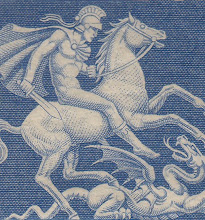was borrn. Then my thoughts always seem to turn to my father, born in 1899, who served in the closing stages of the war. He never spoke about his experiences, all I know was that he was in the Machine Gun Corps and for a period in the trenches he was attached to a regiment of Australians for whom he had great respect.
After the war, he qualified as a accountant and, presumably because he spoke German as his father was Swiss, he secured a job with the Bayer Products, the British subsidiary of the giant Bayer chemical company. He, and my mother, went to Germany numerous times in the late twenties and thirties and on one occasion he visited Hitler's retreat at Berchtesgaden, I don't know if he actually met Hitler!
What he did do during this period was to develop a deep contempt for all our politicians and particularly the pacifists who were pushing disarmament. The only exception was Churchill, who at that time was "out in the cold" for advocating rearmament. As my father frequently told me, in his later years, if you had travelled around Germany at that time as he did, you would have seen all the signs of a country preparing for war. They were devoting massive amounts of effort and money into building the autobahns, far more than could possibly be justified by the number of vehicles using them.
But it seems that most of our politicians of that time were totally blind to what the didn't want to see; Churchill was the main exception and because of this was branded a warmonger. In his memoirs, Churchill frequently refers to "information that I have received from Germany" and similar phrases. I like to think that my father was possibly one of those supplying information, although it seems unlikely.
I do know, at the start of the war when the government asked anyone who had any recent photographs taken in Germany to forward them to the War Office, my father supplied a considerable number. I don't know if this was amongst them, my parents are in the second row, just behind the arrowed girl in the white dress.
BAD NEUENAHR, GERMANY 17.7.35
What would my father think of our politicians today?
Like those of the thirties, most of them seem to prefer to ignore reality. They have taken us into an unwinnable war in Afghanistan and prefer to ignore the realities of what is happening in Europe. They have reduced our military to such an extent that they couldn't possibly defend the Falklands, let alone this country. They refuse to accept that we now have an enemy within due to mass immigration or that Germany remains a threat to Europe, using money this time rather than tanks. And more to the point, if they turn out to be wrong, like Chamberlain, where is the latter day "Churchill" to take over?
Is it any surprise that I, like my father before me, hold the majority of our politicians of all parties in total contempt?
- - o o O o o - -
As a side issue, if there is anyone reading this who has any contacts in Switzerland who might be able to help me find more about my grandfather, Johan Schütz, whom according to the 1911 census was born in Fribourg, Switzerland around 1865, please contact me.



My grandfather hated Churchill. "He sent 50,0000
ReplyDeletemen to their deaths," he would say. My grandfather was at Gallipoli or the Dardanells as he called it,the reason being he was an able seaman.
While he was manning a boat landing troops he was wounded in the leg. He laid on the beach for three days.He saw the sea change from blue to red, such was the slaughter.
The bullet remained in his leg for the rest of his life. The surgeons were unable to remove it.
The Great War was truly horrific.
Oops... Fifty thousand
ReplyDelete